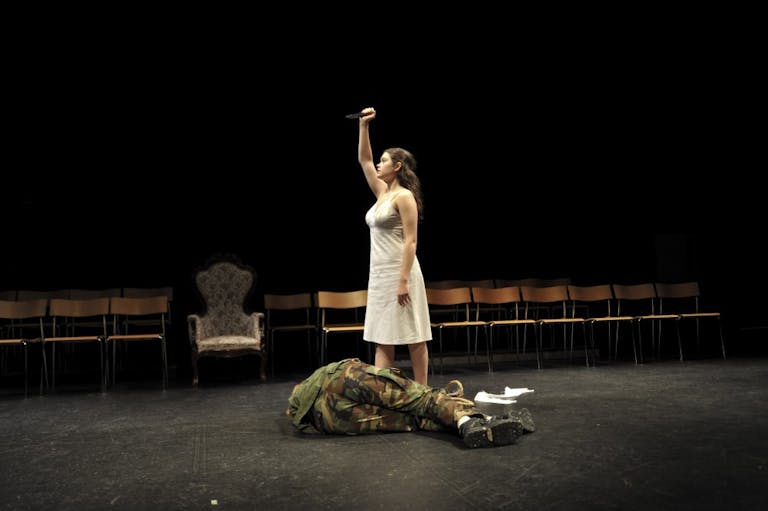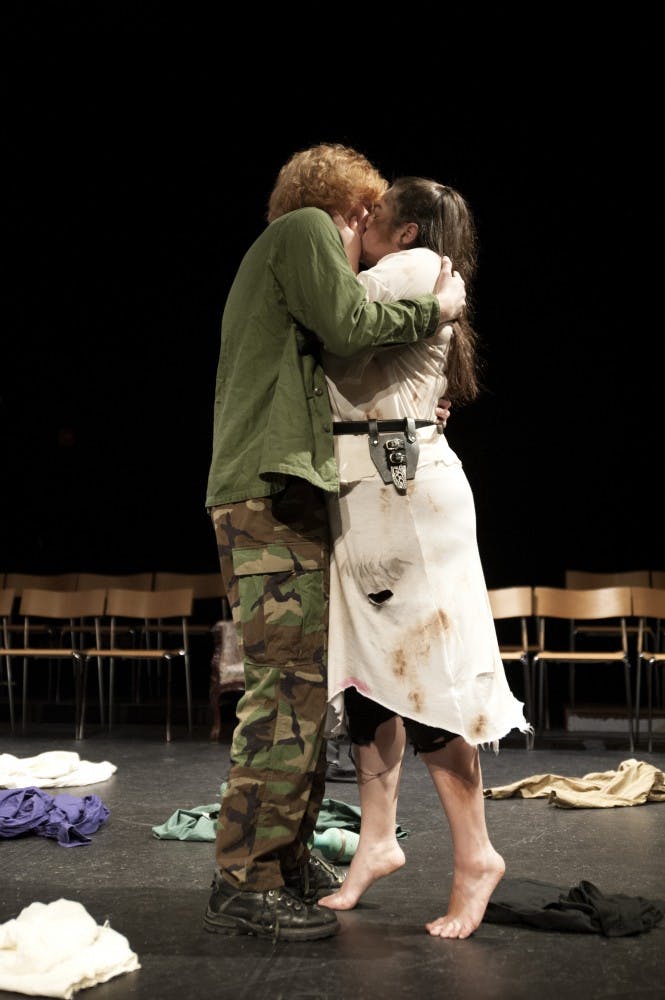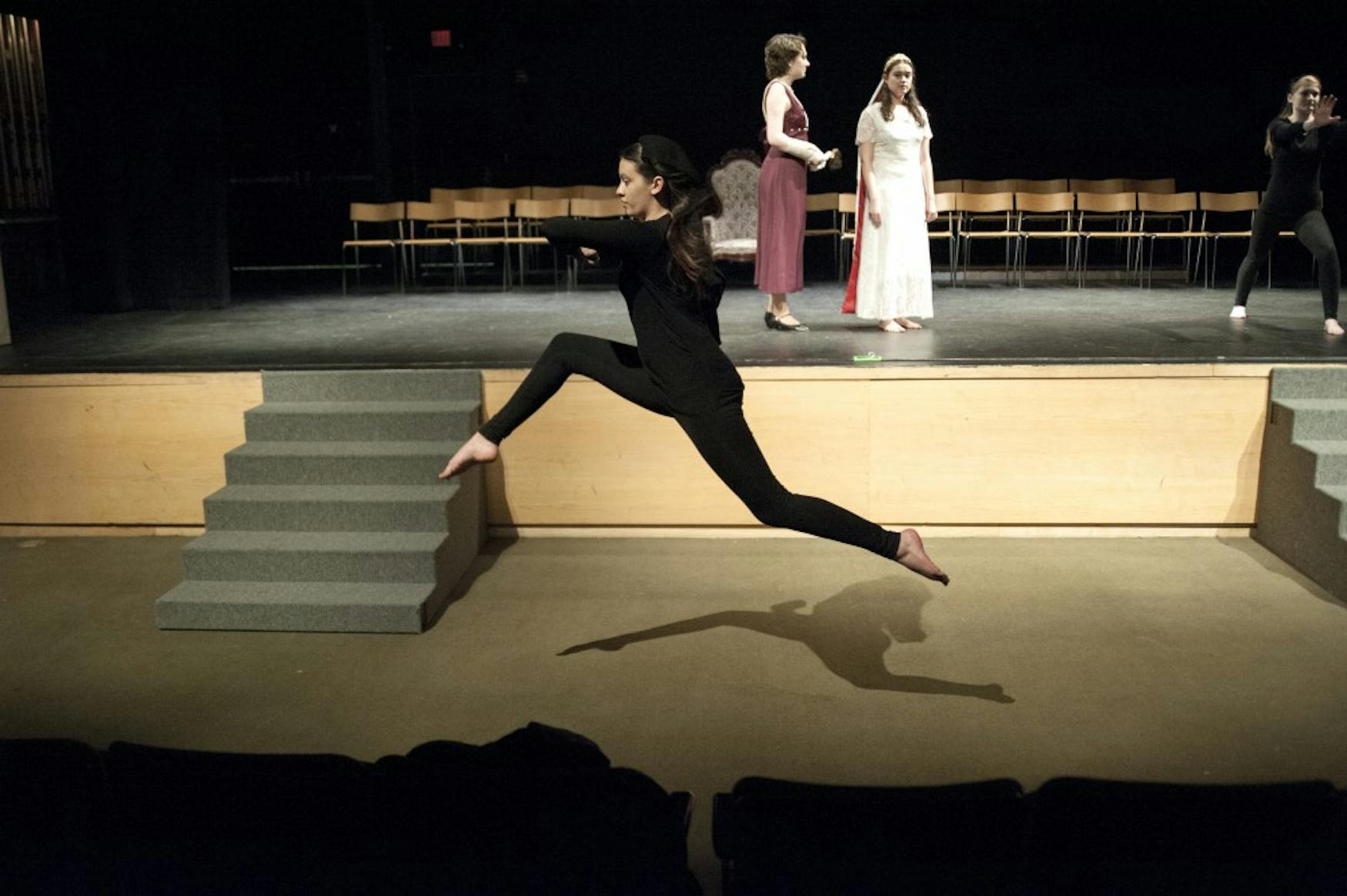A feminist tale of a Greek tragedy
The Brandeis Shakespeare Society, also known as Hold Thy Peace, put on an adaptation of playwright Ellen McLaughlin’s “Iphigenia and Other Daughters” this past weekend in the Shapiro Campus Center. The story revolves around a family of women in ancient Greece who are left behind by the men in their lives who have traditionally defined them, focusing on the lives that are swept to the sides of history to make way for the men. McLaughlin’s take on the aftermath of Iphigenia’s sacrifice to the gods delves deep into the thoughts of Iphigenia, her mother and two sisters.
The director, Sophia Massidda ’20, told a story that continued this theme of female exclusion from history, particularly through Iphigenia’s sister, Electra (Rachel Greene ’20). She barged through the front door, demanding everyone “look at me.” She confesses later in the play that “I used to be someone: I was [Iphigenia’s] sister; first I was someone’s daughter.” This blended well with the motif of invisibility, which was underscored with her constant humiliation. She is demeaned by her mother, Clytemnestra (Amber Ruth Crossman ’21), who observes that women are not part of history, but merely exist at the margins.

THE STATUE OF ARTEMIS: Iphigenia (Zoe Rose ’20) stands over the prostrated body of her long-lost brother Orestes (Rielly Allen ’18).
While McLaughlin touched upon an interesting subject, the story she wrote lies on the other side of the spectrum. The script was full of never-ending, dull monologues addressing the audience. Conversations between two characters felt like interruptions of each other’s spoken-word theses. The play’s three-act structure was unbalanced.
The first act, which only featured two people speaking (not to each other, I might add), stalled the play for half an hour to reach a single plot point that could have been made in 10 minutes.
The second act felt like an eternity, as if it were a lingering thought with no end in sight. The story had no beats, nothing that kept me invested within characters as the plot progressed. McLaughlin was telling, rather than showing; the dialogue was mostly expository and did no favors to my interest in the plot. Characters droned on and on. A succinct script could have done wonders for the story.

ELECTRA-FYING INCEST: Electra (Rachel Greene ’20) kisses her brother Orestes when he comes home from war.
McLaughlin’s heavy-handed vicarious speech is thinly veiled provocative dialogue. I could see that the script held no enjoyment or stimulation, so I looked to the HTP cast and crew for help. Massidda incorporated choices that added some symbolism and much-needed subtlety to the script. Dancers that circled Iphigenia and her mother during the sacrifice in Act One added some levity to the moment, while also inching closer and closer to their victim. The dancers were played by Lexie Vogel ’21 and Hannah McCowan ’19, choreographed by McCowan herself. They mirrored each other in fluid motion and dance, bringing up the cyclical and repetitive nature of life, in that the women of history were relegated to their appearance rather than their actions and words.
Apart from Riely Allen’s ’18 Orestes and Amber Ruth Crossman’s Clytemnestra, no performances struck me as noteworthy. The presence of these two in the play added some perspective, but they were still plagued by McLaughlin’s monologues. The performances ranged from over-the-top to underwhelming (often from the same character) which killed the momentum of the story. Overall, the line delivery was wooden and unenthusiastic. The costumes, however, were well-done despite such a tight budget, some appropriately ragged and torn and others elegant and pretty.
Massidda’s direction did nothing to soften the heavy-handedness of McLaughlin’s script. I couldn’t observe any significant choices in the storytelling that eased the pain of listening to this dialogue. There were one or two rare instances that caught my attention, such as the dancers on the stage or the chemistry between Orestes and Electra.
I want to conclude by insisting most of my opposition toward this play is directed at the script. It gave the cast and crew little to work with and inhibited their potential. I implore the producers to review their future scripts with more caution.




Please note All comments are eligible for publication in The Justice.